In 2020, Southwestern Seminary remained committed to rigorous academics, practical focus despite COVID-19 limitations
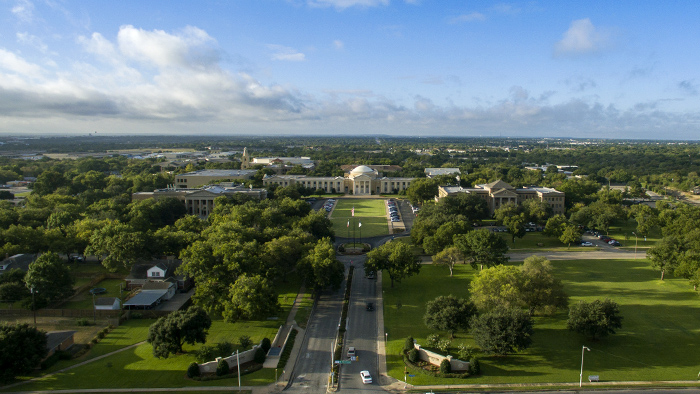
Established in 1908 and making its home in Fort Worth, Texas, since 1910, Southwestern Baptist Theological Seminary has never abandoned its task of equipping men and women to live their calling in fulfillment of the Great Commission. Even in 2020, a year marked by civil unrest and a global pandemic, Southwestern remained true to its mission, adapting to changing circumstances in order to commission 638 graduates for service, strengthen its academic offerings, hire new faculty and leadership, and continue its emphasis on both academic output and evangelistic outreach.
COVID-19 Response
In March 2020, the World Health Organization declared the coronavirus (COVID-19) a pandemic. In response, extreme precautions were taken by businesses and institutions around the world, including Southwestern Seminary. In order to limit any potential harm to the seminary community, the school’s administration, in consultation with the officers of the seminary’s board of trustees, closed the campus and moved all courses to solely online platforms effective March 23 through the spring and summer semesters.
Dormitories were vacated and all on-campus events, including spring commencement, were cancelled. Despite the unprecedented nature of these actions, Southwestern Seminary continued to reach students and constituents through creative means:
- The “Virtual Preview” initiative allowed prospective students to hear from and dialogue with faculty, administration, and admissions staff through live video-conferencing. These preview sessions, spanning March through April, resulted in more first-time student applications than any of the in-person Preview Days from the last three years.
- The School of Church Music and Worship provided resources through its “Artistic Theologian” website to help Christians lead worship in and from their homes while COVID-19 precautions prevented church members from corporate gatherings.
- The Center for Church Revitalization hosted multiple fully online conferences and launched the online “Sermon and Worship Resource Collection,” featuring sermon videos and packages of worship songs available to churches unable to offer their members full Sunday morning services.
- Finally, the seminary launched a new video series titled “Ministry Now” featuring interviews with Southwestern Seminary faculty designed to help ministers live their calling “in an ever-changing ministry landscape,” especially due to COVID-19. Among the first speakers were Dean of Women Terri Stovall, Professor of Preaching and Pastoral Ministry Chris Osborne, Adjunct Faculty and former missionary Rebekah Naylor, and Distinguished Professor of Theology David S. Dockery.
“I have never been prouder to be a Southwesterner as our incredible faculty and staff efficiently moved our entire educational program online in the span of a few weeks to best serve our students during this season of extraordinary disruption for our students, churches, and nation,” said President Adam W. Greenway. “The coronavirus pandemic has not lessened the urgency of theological education; indeed, it has only heightened that urgency.
“Ever since our founding in 1908 and continuing through our storied history up to this very moment, Southwestern Seminary has remained committed to providing biblically and theologically faithful and academically rigorous comprehensive theological education with a strong practical focus on equipping God-called servants of Jesus Christ.”
Following an April 29 announcement by Texas Gov. Greg Abbott that he would allow the stay-at-home order to expire at the conclusion of April and begin a phased re-opening of businesses in the state, Greenway announced that the campus would re-open for the fall semester.
Extensive measures were put in place for the safety of students and faculty returning to campus in the fall. Chairs and desks in every classroom were placed at least six feet apart, and in spaces where chairs could not be moved, clear markers indicated where students could and could not sit.
In addition, face coverings were required, hand sanitizing stations were located all across campus, and markers were placed in necessary spaces to help students physically distance.
Maintaining its focus on not only student safety but also student needs, Southwestern promoted during this time its Student Emergency Assistance Fund (SEAF), which provides support for students adversely affected by crisis or emergency. The fund existed prior to the coronavirus pandemic, but the school’s administrators and Office of Institutional Advancement placed special emphasis upon it this year in order to meet the needs of seminary and college students adversely affected by COVID-19. These needs included housing costs, medical bills, educational costs, groceries, and other emergency matters.
Despite all the difficulties associated with COVID-19, the seminary saw enrollment gains and increased financial stability in the fall semester.
At the fall meeting of the seminary’s board of trustees, the school’s administration shared that 594 new students enrolled for the fall 2020 semester, an increase of 29 percent over the fall of 2019. In financial matters, reports showed a 14.9 percent increase in revenue during the 2019-2020 fiscal year, including a 14.6 percent increase in tuition revenue; and a 215 percent increase in donations to the Southwestern Fund, the school’s annual fund, and 467 more gifts to the seminary than the prior year.
Reflecting on the reports, Greenway expressed his enthusiasm concerning many positive developments at the seminary.
“I have said on a number of occasions that I believe the greatest days of Southwestern Seminary are in our windshield, rather than our rearview mirror, and I have never been more confident in that conviction,” he said. “Our trustees heard reports from across our institution that demonstrate in so many ways how God is blessing richly this institution from faculty, to students, to campus improvements. Even in the midst of COVID-19, Southern Baptists’ ‘crown jewel’ seminary is sparkling even brighter today.”
Spring and Fall Commencements
Though COVID-19 prevented Southwestern Seminary from holding an in-person spring commencement ceremony for the first time in its 112-year history, the school’s administration and faculty still congratulated and celebrated the graduates through digital means. These graduates were also invited to return for the in-person fall commencement ceremony, Dec. 4, and all 2020 graduates were listed in the fall commencement program.
Thus, the fall ceremony recognized, celebrated, and commissioned a total of 638 bachelor’s, master’s, doctoral, and certificate graduates, of whom 223 were present. The ceremony took place in MacGorman Chapel, but due to COVID-19 restrictions, only graduates, faculty, and production staff were present in the room. All wore masks and remained socially distanced throughout the ceremony.
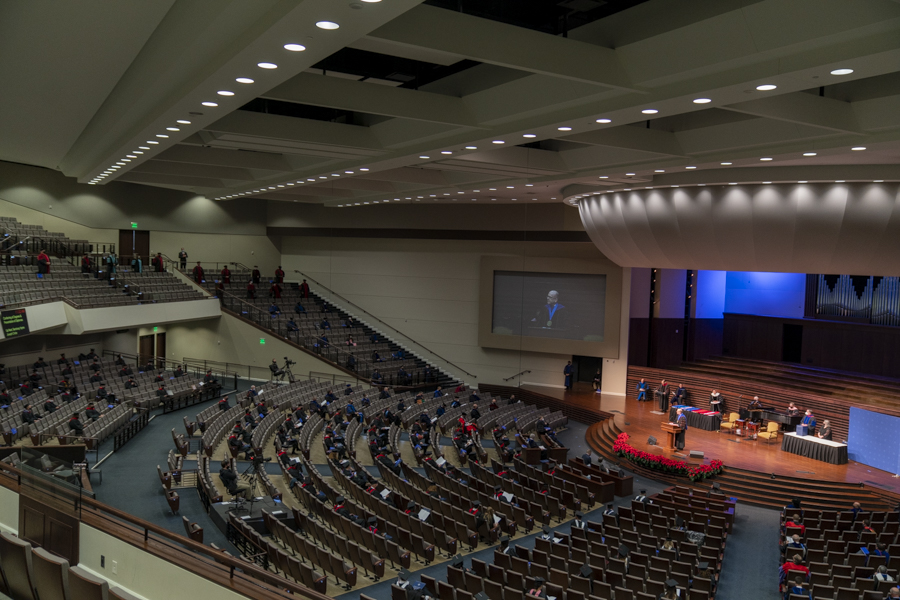
Graduates’ families were invited to view commencement via a live simulcast from various locations across the Fort Worth campus. Masks and social distancing were required in these locations, as well. The ceremony was also livestreamed online.
During his address to the graduates, President Adam W. Greenway noted the unique context in which the students were graduating and in which they will serve, acknowledging not only COVID-19 but also the often-vitriolic rhetoric concerning various issues in society, particularly on social media. Given this context, Greenway posed the question, “How should a watching world know that you are a Southwestern Seminary graduate?”
Preaching from John 13:31-35, Greenway said his prayer for the graduates is that they would follow Jesus’ words in verse 35: “By this everyone will know that you are my disciples, if you love one another.”
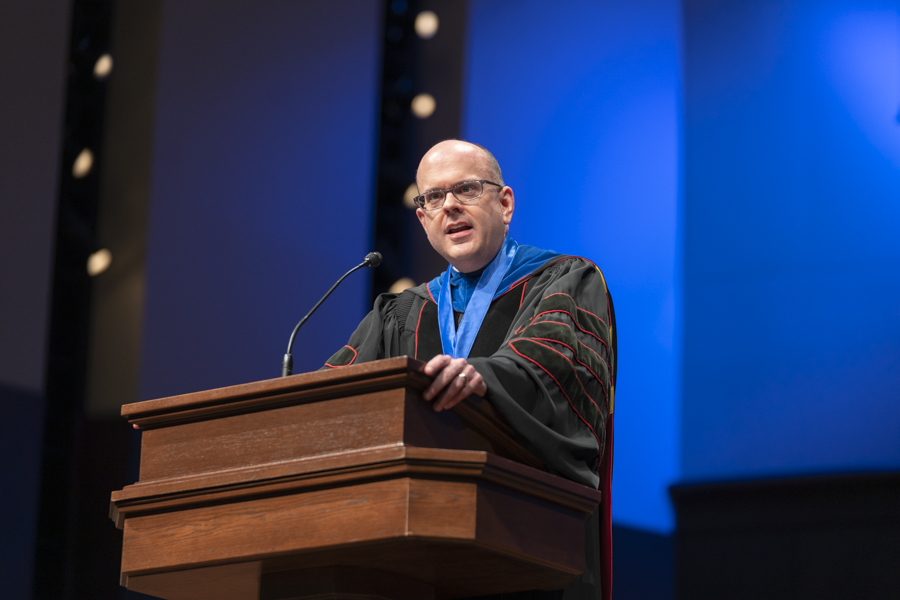
“The need is great,” Greenway said. “The time is short. By this will all people know that you are disciples of Christ and, prayerfully, they will know that you are graduates of the Southwestern Baptist Theological Seminary and Scarborough College: by the love you show one toward another.”
New/Revised Degrees and Programs
At their spring meeting, trustees approved nine new degrees: in Scarborough College, the Bachelor of Arts in Political Economy, Bachelor of Arts in International Studies, Bachelor of Arts in Early Childhood Education, and the Bachelor of Arts in Business Administration; in the Jack D. Terry School of Educational Ministries, the Master of Divinity, Master of Theology, Doctor of Ministry, and Doctor of Education; and in the School of Church Music and Worship, the Master of Theology.
In addition, trustees voted to revise certain degrees within the Terry School, including the Master of Arts in Christian Education, Master of Arts in Biblical Counseling, and Doctor of Educational Ministry. Also, the Master of Arts in Christian Apologetics in the Roy J. Fish School of Evangelism and Missions was revised and renamed the Master of Arts in Great Commission Apologetics. Finally, trustees voted for the School of Preaching—including its faculty, curricula, degrees, centers, and programs—to be absorbed into the School of Theology.
At their fall meeting, trustees approved one new degree, the Master of Divinity in Worship Leadership in the School of Church Music and Worship. This is in addition to two other degrees in the music school offered for the first time in 2020: a newly revised, fully online Master of Arts in Worship Leadership, and the Master of Music in Worship Leadership.
Though not a new degree, the Spanish-language Master of Theological Studies (Maestría en Estudios Teológicos, or MET) was approved by the seminary’s accrediting agency to receive pastors without bachelor’s degrees. The MET is a 36-hour degree, available fully online, that provides basic theological education in Bible, history, and theology.
In addition to these new and revised degree offerings, Southwestern also launched eight-week courses for online students, with the first term beginning April 27. Of these courses, Greenway said, “Long before the novel coronavirus altered our spring semester, Southwestern Seminary academic administration was diligently developing this new, eight-week online course structure to assist students in expediting their theological education. In God’s providence, we’re now positioned to offer these new courses at a time when they will be especially meaningful to our students.”
Two other initiatives are also strengthening the seminary’s academic offerings. First, the Women’s Leadership Institute offers a variety of certificate programs for women serving in any ministry, leadership, or life context. Second, the Research Doctoral Studies Office has launched the ThinkerSpace for Scholar Innovators and the RDS Commons.
The ThinkerSpace for Scholar Innovators provides opportunities for academic development beyond students’ degree programs through engagement and collaborative training among students, faculty, alumni, and visiting scholars. These opportunities include certificate programs such as the Certificate for Teaching Excellence, which comprises a series of workshops and a two-semester teaching assistantship with a mentor professor.
The RDS Commons, located physically in Price Hall and virtually in Canvas, and available exclusively for faculty and Ph.D. and DMA students, encourages individuals to participate in formal interdisciplinary conversations and projects.
“We firmly believe that scholarship that has no avenue for deployment is wasted,” says RDS director Jonathan Arnold. “Our aim is to help our students become effective stewards of the academic gifts and talents God has given them, helping them to engage the world—through the church, the academy, or the broader marketplace—with their specific expertise.”
Institutional Partnerships
Southwestern Seminary announced two institutional partnerships this year, one with Oklahoma Baptist University (OBU) and another with Dallas Baptist University (DBU), both aimed at strengthening each institution’s academic offerings.
The OBU partnership, announced Nov. 11, provides a pathway for OBU bachelor’s students to enter Southwestern Seminary’s master’s programs with advanced standing, expediting their theological education. OBU students will be able to receive master’s credit at Southwestern Seminary for work done at OBU. Thus, upon enrollment at Southwestern Seminary, OBU graduates will already be well down the road toward a master’s degree.
Through the partnership with DBU, announced Oct. 27, the two institutions will offer a joint Master of Divinity/Master of Business Administration degree. Graduate students who meet both institution’s requirements for admission and prerequisites for both schools can earn the M.Div. from Southwestern Seminary and the MBA from DBU with certain coursework at each institution satisfying requirements for coursework at the partner institution.
Commenting on this DBU partnership, Greenway said, “This is a joint venture and joint relationship, and I think something that models the kind of collaboration and cooperation that ought to mark Christ’s people, and certainly ought to mark our work as Baptist institutions of higher learning here in the great state of Texas.”
New Faculty and Staff
The following were elected to the faculty in 2020:
- Jonathan W. Arnold as associate professor of church history and historical theology;
- Carl J. Bradford as assistant professor of evangelism;
- Ted J. Cabal as professor of philosophy of religion;
- Chris S. Osborne as professor of preaching and pastoral ministry;
- and Benjamin Skaug as dean of Scarborough College.
The following were appointed to the faculty in 2020:
- Jon Duncan as senior professor of church music and worship;
- Tom J. Nettles as visiting professor of historical theology;
- Lilly H. Park as associate professor of biblical counseling;
- and Kenneth T. Magnuson as professor of Christian ethics.
In addition, six administrative staff were appointed to the faculty:
- Mark Baker, deputy director of the Darrington Extension Center, was appointed assistant professor of biblical studies;
- Amy L. Crider, director of the Doctoral Center for Writing Excellence, was appointed associate professor of foundations of education;
- Adam Dodd, director of Campus Technology, was appointed assistant professor of Old Testament and biblical backgrounds;
- George Dyson, director of the Darrington Extension Center, was appointed assistant professor of Christian studies;
- Coleman M. Ford, director of professional doctoral studies, was appointed assistant professor of Christian formation;
- and Rebekah Naylor, missionary-in-residence, was appointed as distinguished professor of missions, the first female to ever be so honored at the seminary.
Also, Jeremiah Kim, assistant professor of theology and director of Korean Doctor of Ministry studies, and Dietmar Schulze, associate professor of missions and associate director of the Master of Arts in Theology program for the Bonn, Germany, extension center, were renewed in their presidential appointments.
Finally, at the administrative level, R. Clark Logan Jr. was elected vice president for business administration, and David S. Dockery was named interim provost following the departure of Randy L. Stinson.
Academic Output
Demonstrating Southwestern Seminary’s ongoing commitment to strong academics, Dockery—“a universally respected theologian and Southern Baptist statesman of Christian higher education”—was named editor of the Southwestern Journal of Theology, the academic journal of Southwestern Seminary and “one of the premier and historic publications in theological education,” said Greenway.
“SWJT is one of the premier and historic publications in theological education. More specifically, SWJT is the oldest theological journal continually published by a Southern Baptist seminary, with a history dating back to 1917. Dr. Dockery’s winsome and irenic spirit and resolute theological convictions personify key qualities that I believe have and must characterize Southwestern Seminary when we are at our best.”
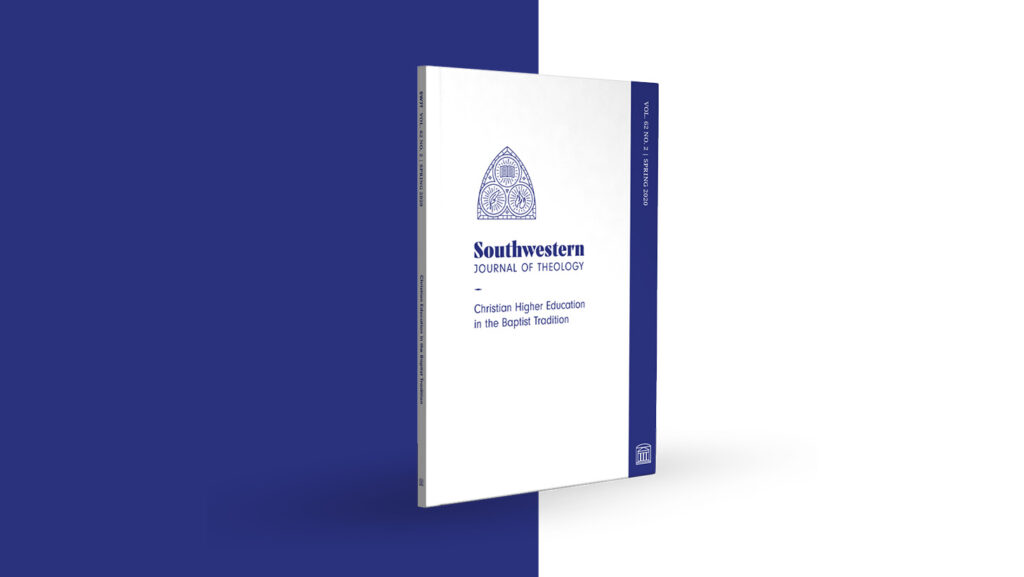
Two issues of the journal were released in the latter part of this year under Dockery’s direction, and will publish a regular schedule of spring/fall issues in 2021. Among the new initiatives of the journal, the first annual SWJT-sponsored Book of the Year Awards were announced this December. Faculty members from all five of Southwestern’s schools participated in the selection of award recipients, and 37 books from 14 different publishers were recognized, including two faculty-authored texts and four titles with faculty contributions. Carl R. Trueman’s The Rise and Triumph of the Modern Self: Cultural Amnesia, Expressive Individualism, and the Road to Sexual Revolution (Crossway) was named the “Book of the Year.”
Seminary Hill Press, the publishing arm of Southwestern Seminary, released three new titles this year: a 40th-anniversary edition of Baptists and the Bible, by L. Russ Bush and Tom J. Nettles; a new edition of The Doctrine of the Bible, by David S. Dockery; and a third edition of the best-selling title Everyday Evangelism, by Matt Queen.
Other faculty publications this year included:
- Draw Near: The Heart of Communion with God (Wipf and Stock), by Scott Aniol
- Tune My Heart: Bible Narratives Devotional Guide for Families or Individuals (Religious Affections Ministries), by Scott Aniol
- Regeneration, Revival, and Creation: Religious Experience and the Purposes of God in the Thought of Jonathan Edwards (Wipf and Stock), with a contribution by Robert W. Caldwell III
- 1 & 2 Peter and Jude: The Christian Standard Commentary (Holman Reference), edited by David S. Dockery
- Arise Together: How the Body of Christ is Finding Hope through the Pandemic (The Christian Post), with a contribution by David S. Dockery
- Christian Worldview Handbook (Holman Reference), co-edited by David S. Dockery
- Baptists and the Christian Tradition: Toward an Evangelical Baptist Catholicity (B&H), with contributions by David S. Dockery, W. Madison Grace II, and Malcolm B. Yarnell III
- Brahms’s A German Requiem: Reconsidering Its Biblical, Historical, and Musical Contexts (University of Rochester Press), by R. Allen Lott
- Invitation to Christian Ethics: Moral Reasoning and Contemporary Issues (Kregel Academic), by Ken Magnuson
- The Baker Illustrated Bible Background Commentary (Baker Books), with contributions by Eric Mitchell and Mark E. Taylor
Evangelistic Outreach
Southwestern Seminary did not focus merely on academics in 2020; it also emphasized practical ministry. This was demonstrated this year through faculty and students’ ongoing commitment to sharing the Gospel with the lost.
Despite COVID-19 restrictions putting the seminary’s formal door-to-door evangelism efforts on pause, seminary students and faculty continued to make evangelism an everyday effort, utilizing preexisting relationships, technology, and even, in some cases, socially distanced door-to-door efforts to continue proclaiming the Gospel to the lost.
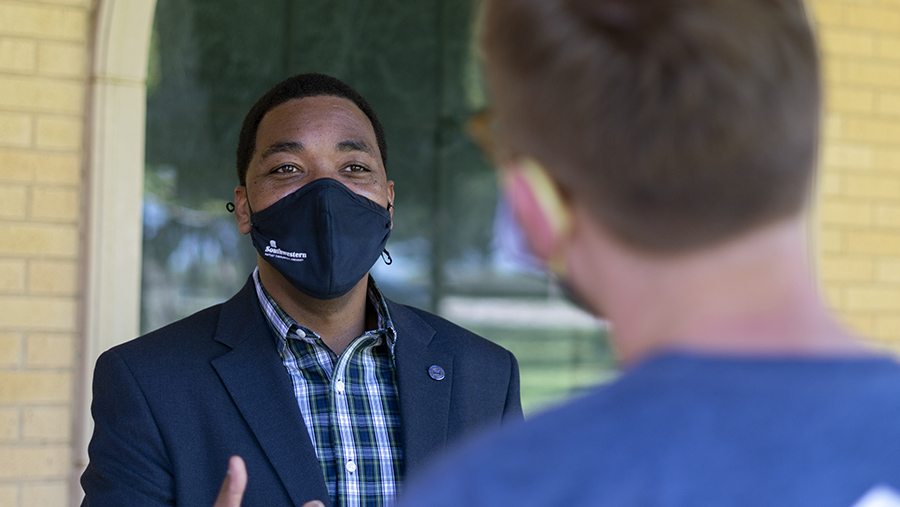
Matt Queen, L.R. Scarborough Chair of Evangelism, hears testimonies often from both current and former students who have continued sharing the Gospel amidst the pandemic. One student who comes from a Muslim background has been sharing the Gospel via Zoom with Muslims in north Africa, and after one of these meetings early this fall, he texted Queen that “many people accepted our Lord.”
Another student emailed Queen, explaining that he took what he is learning and reading about in class and was able to lead a young man to the Lord, who then planned to be baptized.
Yet another student shared with Queen that he joined a bowling league in order to share the Gospel with his teammates, which he did. The student concluded his message, “It’s what I learned at Southwestern that’s prompted me to do evangelism through this bowling league.”
“So I’m still getting stories frequently,” Queen says, “which tells me that evangelism at Southwestern is not just something that is dependent upon this structure [that is, the formal door-to-door efforts], but it’s actually something that is still going on outside of the structure.”
John D. Massey, dean of the Roy J. Fish School of Evangelism and Missions, says, “Even though ‘Everyday Evangelism’ has been on pause due to COVID-19, our students are reporting that their Gospel witnessing efforts have grown exponentially with family, friends, neighbors, and co-workers. The design of ‘Everyday Evangelism’ is to create an awareness and ability in students to share the Gospel as they encounter people throughout their day and week. It is times like these when we cannot go door to door that we see that the training actually works in the everyday life of the students.”



